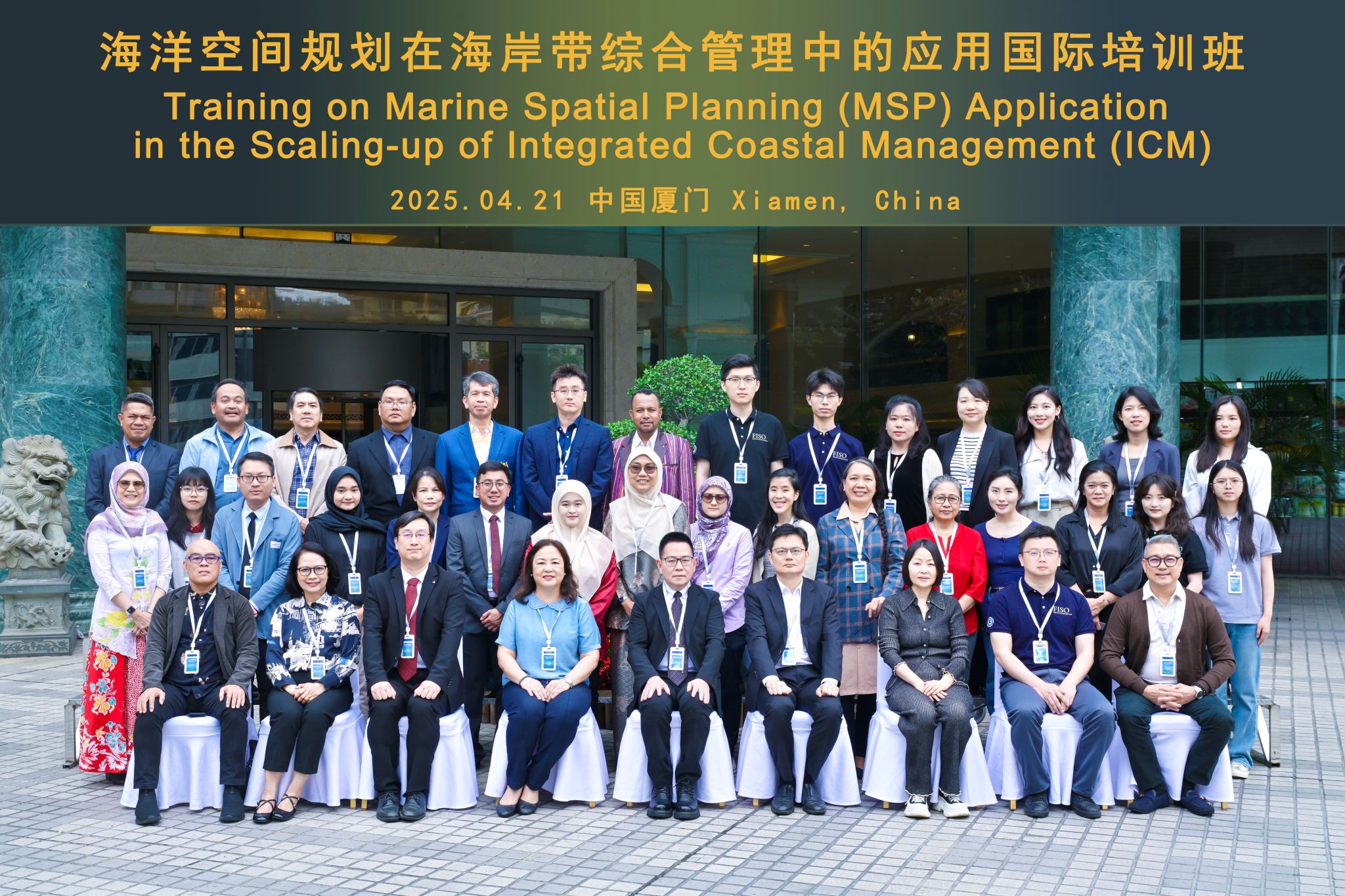2025年4月21日,由中国海洋发展基金会指导、厦门大学福建海洋可持续发展研究院(以下简称:闽海院)/海岸带可持续发展能力建设实验室与东亚海环境管理伙伴关系组织(Partnerships in Environmental Management for the Seas of East Asia, PEMSEA)共同主办的“海洋空间规划(Marine Spatial Planning, MSP)在海岸带综合管理(Integrated Coastal Management, ICM)中的应用”国际培训班在厦门正式拉开帷幕,来自东帝汶、菲律宾、柬埔寨、老挝、马来西亚、泰国、文莱、新加坡、印度尼西亚、越南和中国共计11个国家的40多名科研工作者参加了本次培训。

开幕式合影
Group Photo
开幕式由闽海院副院长李杨帆教授主持。李杨帆教授首先对中国海洋发展基金会和PEMSEA的大力支持表示感谢,代表主办方对远道而来的国际同仁致以热烈欢迎。李杨帆教授强调,厦门大学在海洋、生态、环境等学科建设与海岸带可持续发展领域拥有长期积累,期待通过本次培训搭建跨国交流平台,推动海岸带综合管理与海洋空间规划技术在东亚海域的广泛应用与实践。

主持人李杨帆
Host Li Yangfan
厦门大学环境与生态学院党委书记王晟为本次培训致欢迎辞。王晟书记指出,在中国海洋发展基金会的大力支持下,闽海院自成立以来便积极投身海岸带可持续发展能力建设工作。闽海院拥有厦门海岸带综合管理多年积累的丰富经验,且借助厦门大学的强大科技支撑,与 PEMSEA 在海岸带综合管理国际培训领域开展了长期且深入的合作。自 2019 年至今,已累计为 15 个国家的 200 多名海洋管理相关人员提供培训,获得广泛赞誉。此外,闽海院还实施了多个国际合作项目,如马来西亚、印尼海洋空间规划合作研究项目等,积极分享中国海洋空间规划经验与技术。2023 年 11 月揭牌成立的 “海岸带可持续发展能力建设实验室”,将进一步推动区域海岸带可持续发展能力的提升。王晟书记期待与各位学员未来开展更多合作交流,共同为全球海洋治理贡献力量。

王晟致欢迎辞
Wang Sheng Delivering Welcoming Speech
随后,中国海洋发展基金会副理事长/秘书长潘新春教授致开幕辞。潘新春教授首先强调了海洋空间规划对推动海洋与海岸带可持续发展的重要意义。他指出,中国政府高度重视海洋与海岸带的保护、开发与综合管理工作,建立了基于和合文化和自然解决方案的海洋与海岸带综合管理体系,涵盖法律法规、政策规划、技术标准、审批监管等多个方面,并取得显著成效。在海洋与海岸带保护方面,中国建立了众多海洋自然保护区和特别保护区,划定海洋生态红线,大力开展海岸线和滨海湿地整治修复;在海洋经济发展方面,海洋经济总产值持续增长,形成多个海洋经济圈,部分海洋产业位居世界前列;在海洋与海岸带综合管理方面,制定并实施科学的海洋空间规划,形成了可供借鉴的中国方案和经验。潘新春教授还表示,中国海洋发展基金会将持续助力“一带一路” 沿海国家的海洋能力建设,分享海洋治理的中国智慧。

潘新春致开幕辞
Pan Xinchun Delivering Opening Speech
最后,PEMSEA执行主任Aimee Gonzales女士为开幕式致开幕辞。Aimee女士首先对闽海院和中国海洋发展基金会对本次培训班的支持表示感谢。她提到,30年来,PEMSEA一直致力于推动东亚海区域的海洋与海岸带可持续发展,与厦门大学和闽海院是多年的合作伙伴。长期以来,闽海院围绕东亚海地区的海洋治理知识共享开展了大量工作,本次培训班也是为促进地区之间的知识和资源共享而开展。她呼吁参加培训的20个单位以此为契机,强化ICM与MSP的协同机制,共同应对海洋环境与发展挑战,为各级政府的海洋与海岸带管理提供科学与技术支持。

Aimee Gonzales 致开幕辞
Aimee Gonzales Delivering Opening Speech
开幕式后,东亚海环境管理伙伴关系计划学习中心网络(PNLC)秘书处协调员、印尼茂物农业大学研究员Isdahartati Ibnu Izhar女士介绍了本次培训的日程安排、培训目标、授课专家和学员情况。之后,中国海洋发展基金会副理事长/秘书长潘新春教授以“经略海洋:中国的实践与成就”为题做专题讲座,正式拉开了本次培训班的序幕。

潘新春授课
Pan Xinchun Delivering Lecture
本次培训班吸引了11个国家众多国际组织、业内专家的积极参与,是对我方近年来在ICM和MSP科学研究及能力建设工作的充分肯定,也是闽海院和海岸带可持续发展能力建设实验室助力“海上丝路"沿线海洋科技软实力提升的又一次重要行动;是落实PEMSEA“海岸带综合管理”理念的重要合作活动,也是中国海洋发展基金会推动区域海洋治理能力建设的关键举措。此次培训班将为沿海国家提供可复制的MSP-ICM融合方案,助力构建更具韧性的海洋空间管理体系,为东亚海域的可持续发展注入新动能。

会场图片
Session Photo
On April 21, 2025, the training on " Marine Spatial Planning (MSP) Application in the Scaling-up of Integrated Coastal Management (ICM)" , which is supported by the China Oceanic Development Foundation (CODF) and jointly organized by the Fujian Institute for Sustainable Oceans (Xiamen University) (hereinafter referred to as FISO)/Sustainable Coastal Development Capacity-Building Research Lab (SCD Lab) and the Partnerships in Environmental Management for the Seas of East Asia (PEMSEA), officially commenced in Xiamen. Over 40 professionals from 11 countries, including Brunei, Cambodia, China, Indonesia, Laos, Malaysia, the Philippines, Singapore, Thailand, Timor-Leste, and Vietnam, participated in the training.
The opening ceremony was hosted by Professor Li Yangfan, Vice Dean of FISO. Professor Li first expressed gratitude to CODF and PEMSEA for their strong support and extended a warm welcome to participants. Upon introducing Xiamen University’s long-standing expertise in marine science, ecology, and environment studies, as well as coastal sustainable development, Professor Li hoped that the training could serve as a transnational exchange platform to help promote the application of ICM and MSP in the East Asian Seas region.
Wang Sheng, Party Secretary of College of the Environment and Ecology, Xiamen University, delivered a welcome speech. He noted that, with CODF’s support, FISO has actively engaged in capacity-building for coastal sustainable development since its establishment. Leveraging Xiamen’s rich experience in ICM and the university’s scientific expertise, FISO has held training workshops (some of which in collaboration with PEMSEA) drawing over 300 maritime professionals from 16 countries since 2019, receiving widespread recognition. FISO has also conducted international initiatives on marine spatial planning cooperating with Malaysian and Indonesian partners, sharing China’s MSP experience and technology. Furthermore, the newly established SCD Lab is expected to further strengthen regional capabilities. In closing his speech, Mr. Wang expressed hope for future collaborations to advance global ocean governance.
Pan Xinchun, Vice President and Secretary-General of CODF, delivered an opening remark. He underscored MSP’s significance in driving coastal sustainable development, highlighting China’s integrated management system rooted in harmony-and-unity philosophy and ecology-based solutions. This system spans laws, policies, technical standards, and regulatory oversight, yielding remarkable outcomes. Supported by this system, China has established plenty of marine protected areas, delimited marine ecological conservation redlines, and restored coastlines and wetlands. Its marine economy has also grown steadily, forming multiple marine economic clusters with globally leading industries. By implementing MSP, China has developed solutions that can be referred and adapted by others. Pan then reaffirmed CODF’s commitment to supporting capacity-building in Maritime Silk Road nations and sharing best practices of China’s ocean governance.
Aimee Gonzales, Executive Director of PEMSEA, addressed an opening remark, thanking FISO and CODF for their support. She noted PEMSEA’s 30-year dedication to sustainable coastal development in the East Asian Seas Area, and its longstanding partnership with Xiamen University and FISO. The training, she said, aims to foster knowledge and resource sharing, urging the 20 participating institutions to strengthen ICM-MSP integration mechanism and provide scientific support for governments to tackle marine challenges.
Following the ceremony, Isdahartati Ibnu Izhar, Coordinator of the PEMSEA Network of Learning Centers (PNLC) Secretariat and researcher at Indonesia’s IPB University, introduced the training agenda, objectives, lecturers, and participants. Prof. Pan Xinchun then delivered a lecture titled "Strategizing the Oceans: China’s Practices and Achievements," marking the training’s official start.
The training’s strong participation of experts from 11 countries reflects global recognition of FISO’s ICM and MSP research and capacity-building efforts. It represents another step by FISO and SCD Lab to facilitate ocean governance capacity-building for Maritime Silk Road countries, promotes PEMSEA’s ICM vision, and underscores CODF’s commitment in regional ocean governance. The training aims to provide insights for MSP-ICM integration solutions, foster resilient marine spatial management systems, and inject new momentum into regional sustainable development.


